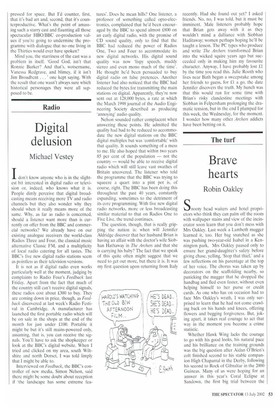Digital delusion
Michael Vestey
Idon't know anyone who is in the slightest bit interested in digital radio or television or, indeed, who knows what it is, People dimly perceive that digital broadcasting means receiving more TV and radio channels but they also wonder why they should when it really means more of the same. Why, as far as radio is concerned, should a listener want more than is currently on offer from the BBC and commercial networks? We already have on our existing analogue receivers the world-class Radios Three and Four, the classical music alternative Classic FM, and a multiplicity of local radio catering for all tastes. The BBC's five new digital radio stations seem as pointless as their television versions.
It is not as if digital radio even works particularly well at the moment, judging by complaints to Radio Four's Feedback last Friday. Apart from the fact that much of the country still can't receive digital signals, these radios cost about £300 to buy. They are coming down in price, though, as Feedback discovered at last week's Radio Festival in Cambridge. A manufacturer has launched the first portable radio which will be on sale in the shops at the end of the month for just under £100. Portable it might be but it's still mains-powered only, assuming, that is, you can receive the signals. You'll have to ask the shopkeeper or look at the BBC's digital website. When I tried and clicked on my area, south Wiltshire and north Dorset, I was told limply that I might be able to.
Interviewed on Feedback, the BBC's controller of new media, Simon Nelson, said there might be some doubt about reception if 'the landscape has some extreme fea
tures'. Does he mean hills? One listener, a professor of something called opto-electronics, complained that he'd been encouraged by the BBC to spend almost £800 on an early digital radio, with the promise of CD sound quality, only to find that the BBC had reduced the power of Radios One, Two and Four to accommodate its new digital networks. His digital sound quality was now lispy speech, muddy stereo and even mono much of the time'. He thought he'd been persuaded to buy digital radio on false pretences. Another listener had also noticed that the BBC had reduced the bytes for transmitting the main stations on digital. Apparently, they're now sent out at 128.000 bytes, a rate at which the March 1998 journal of the Audio Engineering Society described as producing 'annoying' audio quality.
Nelson sounded rather complacent when answering these points. He admitted the quality had had to be reduced to accommodate the new digital stations on the BBC digital multiplex but was 'comfortable' with that quality. It sounds something of a mess to me. He also hoped that within two years 85 per cent of the population — not the country — would be able to receive digital radio which will still leave vast swathes of Britain uncovered. The listener who told the programme that the BBC was trying to squeeze a quart into a pint pot is, of course, right. The BBC has been doing this throughout the past 40 years, constantly expanding, sometimes to the detriment of its core programming. With five new digital radio networks, more or less broadcasting similar material to that on Radios One to Five Live, the trend continues.
The question, though, that is really gripping the nation is: when will Jennifer Aldridge discover that her husband Brian is having an affair with the doctor's wife Siobhan Hathaway in The Archers and that she is carrying his baby? The fact that we speak of this quite often might suggest that we need to get out more, but there it is. It was my first question upon returning from Italy recently. Had she found out yet? I asked friends. No, no, I was told, but it must be imminent. Male listeners probably hope that Brian gets away with it as they wouldn't mind a dalliance with Siobhan Haditaway; women perhaps hoping he'll be taught a lesson. The PC types who produce and write The Archers transformed Brian into the wicked squire years ago but succeeded only in making him my favourite character. Anyway, I have probably lost £1 by the time you read this. Julie Rooth who lives near Bath began a sweepstake among her friends to guess, for £1 a go, the date Jennifer discovers the truth. My hunch was that this would run for some time with Brian's risky clandestine meetings with Siobhan in Felpersham prolonging the dramatic tension, but in the end I plumped for this week, the Wednesday, for the moment. I wonder how many other Archers addicts have been betting on it.


































































 Previous page
Previous page